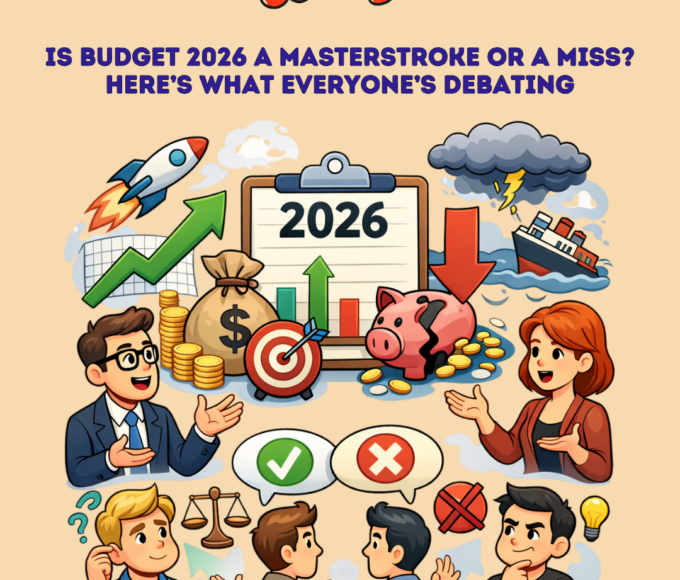Editor – Mugil Ganesh ||
In today’s digital age, Investments are no longer the exclusive domain of Wall Street or Dalal Street professionals. Aarav, a 21-year-old fresh graduate who had just started earning, had always been fascinated by finance. His curiosity grew during his countless hours on social media, where he discovered financial influencers, or “finfluencers.” These charismatic personalities, with their catchy thumbnails and confident advice, promised to unlock the mysteries of the stock market.
Among the finfluencers, one stood out: Raghav Trades. With his captivating voice and impressive track record, Raghav presented himself as a self-made crorepati who had cracked the code of the stock market. Aarav, like many of our GenZ peers, was drawn to the allure of quick profits and the idea of financial independence that Raghav and others promoted. He started investing in the stocks Raghav tipped. Sound familiar? This is how most of our GenZ investors are investing.
How GenZ Investors are Investing and Being Carried Away by Finfluencers
We, the Gen Z investors, are digitally savvy and enthusiastic about the ability to invest in small amounts. The widespread availability of financial information on social media and other online platforms attracts us. The Fear Of Missing Out (FOMO) on making money, combined with the influence and pressure from our peers, drives us to enter the financial markets. The impact of finfluencers on young Gen Z investors like Aarav reflects a broader trend. According to a study by the CFA Institute titled “Gen Z and Investing: Social Media, Crypto, FOMO, and Family,” 48% of Gen Z investors name social media, and 30% name finfluencers as their primary go-to source for investment advice.
This shift represents a significant demographic change in the investment landscape, with more people seeking financial advice from social media rather than traditional sources. The rise of finfluencers has democratized access to financial knowledge, but it has also introduced new risks. Unverified advice from finfluencers, who often lack formal qualifications and regulatory oversight, can mislead investors. Some finfluencers may have vested interests in certain stocks, leading to market manipulation and significant losses when the market corrects. Social media trends can push young investors toward volatile assets like cryptocurrencies without understanding the risks. Additionally, heavy reliance on finfluencers can result in poorly diversified portfolios, increasing vulnerability to market fluctuations.
SEBI’s Actions Against Misleading Finfluencers
Last year, the Securities and Exchange Board of India (SEBI) initiated an investigation against Mohammad Nasiruddin Ansari, owner of the popular YouTube channel “Baap of Chart,” with over 446,000 subscribers and 70 million views. SEBI discovered that Ansari was promoting himself as a stock market expert on social media, offering ‘educational courses’ for a fee and promising near-certain profits. Contrary to his claims of 20-30% gains, he was actually incurring a net trading loss of about ₹2.9 crores. SEBI ordered Ansari to refund the amounts collected from his followers and banned him from trading in securities.
This case is not an isolated incident. SEBI has also taken action against other well-known finfluencers like PR Sundar and Bharti Share Market for misleading investors. Despite SEBI’s interventions, the money lost by influenced investors often remains unrecovered.
SEBI’s Recent Regulations Targeting FinFluencers
On 27th June, SEBI introduced guidelines prohibiting SEBI-regulated entities from associating with unregistered influencers. The market regulator stated “The persons regulated by the Board and the agents of such persons shall not have any association, like, any transaction involving money or money’s worth, referral of a client, interaction of information technology systems or any other association of similar nature or character, directly or indirectly with any person who directly or indirectly provides advice or recommendation”
However, SEBI allows these entities to engage in associations for investor education, provided no investment recommendations or performance claims are made by them.
While these regulations increase compliance risks and costs, they are welcomed by industry experts as misled investors often face severe repercussions, such as losing confidence in the stock market and avoiding it for life. This impacts personal financial growth and market participation rates. Additionally, some investors may use borrowed funds, leading to debt traps and financial distress when promised returns fail to materialize.
So as smart investors, what should we do to get away from the noises of the fake finfluencers and invest prudently?
How Should the GenZ Investors Invest?
In today’s financial landscape, many investors are confusing trading with investing. An alarming number of individuals are venturing into futures and options (F&O) trading, lured by the promise of quick profits but often unaware of the significant risks involved. This “get rich quick” mentality can lead to substantial financial losses. SEBI, the market watchdog, has been closely monitoring retail traders’ participation in the F&O segment and consistently warns about the potential dangers. It is crucial for investors to differentiate between trading and investing and to avoid entering the F&O market without a thorough understanding of its inherent risks.
We, Gen Z, entering the world of investing, have a unique opportunity to build substantial wealth through informed and strategic decisions. Here’s a structured guide on how we can invest wisely:
- Educate Ourselves:
Before investing, it’s crucial to build a solid foundation of financial knowledge. Educating ourselves about the various avenues for investing and the risks associated with them is essential. While social media offers a wealth of information, we must be cautious about taking advice from unverified sources. Financial influencers, or “finfluencers,” might not always have the qualifications or intent to provide sound financial guidance. Always cross-verify advice with trusted financial resources and consult a registered financial advisor if needed. Platforms like Zerodha Varsity are excellent places to start learning about investing.
- Set Clear Financial Goals:
Define your investment goals and the purpose behind them. Whether it’s saving for retirement or short-to-medium-term goals like buying a car or a house, having clear goals helps in choosing the right investment vehicles and strategies.
- Prioritize Insurance:
Insurance is a crucial part of a sound financial plan. Ensure you have adequate health and life insurance coverage to protect yourself and your loved ones.
- Build an Emergency Fund
Before diving into investments, ensure you have an emergency fund that covers 3-6 months of living expenses. This fund acts as a financial safety net and prevents you from having to liquidate investments during emergencies.
- Diversify Your Portfolio
Diversification is key to managing risk. Don’t put all your money into one type of investment. Spread your investments across various asset classes such as stocks, bonds, gold and real estate.
- Stay Informed and Avoid Impulsive Decisions
Keeping up with financial news and market trends helps in making informed decisions. However, avoid making impulsive decisions based on market volatility or short-term news.
Investing as a Gen Z can be both exciting and daunting. The allure of finfluencers is strong, but it’s crucial to approach investing with a well-informed and cautious mindset. SEBI’s recent regulations are a step towards creating a safer investing environment, but the responsibility ultimately lies with us, the investors. Remember, investing is a marathon, not a sprint. Start early, keep educating yourself, stay informed, and be patient to reap the benefits in the long run.
What do you think about the recent regulations by SEBI? Or who are your favourite finfluencers, and what’s their influence on your investments? We would be happy to hear your thoughts. Feel free to reach out to us with your thoughts at tjef.tapmi@manipal.edu.
Note: Aarav and Raghav are fictional characters created to represent an average GenZ investor and a finfluencer, respectively.
References:
- https://rpc.cfainstitute.org/-/media/documents/article/industry-research/Gen_Z_and_Investing.pdf
- https://www.livemint.com/market/stock-market-news/sebi-bans-baap-of-chart-from-securities-market-orders-refund-of-rs-17-20-crore-in-unlawful-gains-11698241713622.html
- https://www.sebi.gov.in/media-and-notifications/press-releases/jun-2024/sebi-board-meeting_84448.html

















Leave a comment